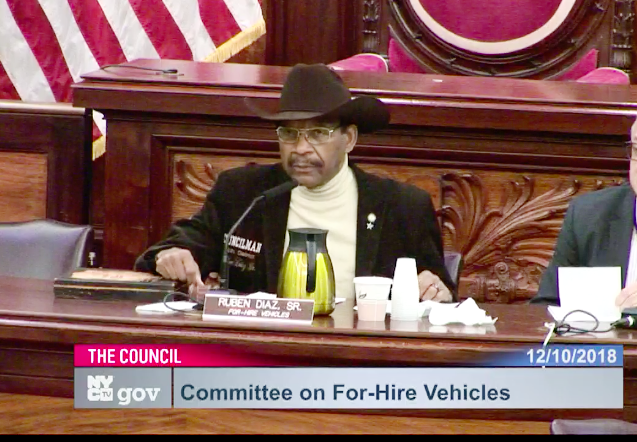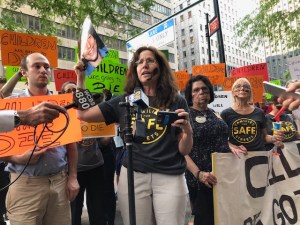Council Pulls Anti-Safety Cab Bill After Streetsblog Expose


Council Member Ruben Diaz Sr. angrily accused unnamed council staffers of working behind his back over the weekend to undermine the intent of his original bill, Intro 1249, which proposed to eliminate the Critical Driver Program. That program allows the TLC to suspend the license of drivers who rack up six or more summons points within 15 months and revoke the license of drivers who get more than 10 such points in the same period.
He likened the actions of the unnamed staffers to one of the moments in American history.

“On Friday, Dec. 7, Pearl Harbor day, the day of infamy … in the afternoon, at around 5 p.m., my bill was changed …to satisfy the mayor’s office,” Diaz said at a council hearing on Monday morning that ended quickly because Diaz refused to take testimony on the amended bill. “My bill was supposed to eliminate the Critical Driver Program. [The new bill] 1249A eliminated it, but the effect of the CDP was [put] into another program. Therefore, I cannot support that. That’s not what I came here for. … It was done at the last minute. I apologize for you who came here to testify.”
Several members of Families for Safe Streets had prepared to speak against the bill, which would make it harder for TLC to remove dangerous cabbies from the street.
Some drivers have complained that they are subject both to summons points received in tickets written by cops — only to find that they get hit with additional points from the TLC for the same violations. Diaz also said he was compelled to act because “eight drivers have killed themselves.” It is unlikely that any of the eight cabbie suicides took their own lives because of strict driving rules; most of the coverage of the deaths has focused on the economic hardship drivers have faced due to the collapse in medallion values in the Uber and Lyft era.
The TLC says it applies additional points for serious safety infractions because taxi drivers much be held to a higher standard than regular drivers — and, indeed, more than 3,000 taxi drivers had their licenses revoked or suspended during 2017.
Even some taxi driver advocates support the Critical Driver Program.
“We wouldn’t support just getting rid of the Critical Driver Program,” Bhairavi Desai, executive director of the New York Taxi Workers Alliance, told Politico. “There do need to be important distinctions between professional drivers and private motorists. Without that distinction, you have the chaos of the transportation network company model, which exists outside of New York City, where there are no barriers to entry.”
Diaz did not return a call, but an aide, controversial former TLC Commissioner Chris Lynn, defended the bill on the grounds that the Critical Driver Program does not give taxi drivers due process.
“The number of tickets [issued to taxi drivers] is going down,” Lynn claimed. “That shows there’s no need for this program.”
Again, that claim was refuted by advocates.
“TLC issued approximately 9,000 summonses to TLC-licensed drivers in 2017 under the Critical Driver Program — all of whom had accumulated six points or more for dangerous driving violations,” said Marco Conner, co-executive director of Transportation Alternatives. “Of those 9,000, only 3,000 ultimately had their licenses suspended … whereas approximately 6,000 did not have their licenses suspended by the TLC. In those 6,000 cases TLC was lenient, and after drivers pled their case decided to not suspend their licenses, for example if it was the first time they reached six points or otherwise had a reasonably safe driving record.”

